This book is a pleasure to read, not least because it pricks so many pretensions. While it deals with an important subject, it manages to sustain a breezy style that draws you in. The subtitle tells you the stance of the authors: the emerging church movement, which taught an entire generation to rebel, is now old enough to find growing numbers of people learning to rebel against the rebellion.
Two thoughtful young guys with different styles, Kevin DeYoung (the pastor-theologian) and Ted Kluck (the journalist), have teamed up to write Why Were Not Emergent. The result is a fair-minded, biblically grounded, insightful book. Its clear that DeYoung and Kluck are not motivated by the desire to criticize, but rather by their love of the church as the body of Christ. This is now the first book Id give someone who asks the question, What is the emerging church? Highly recommended!
WHY
WERE NOT
EMERGENT
(BY TWO GUYS WHO SHOULD BE)
KEVIN DEYOUNG
TED KLUCK
MOODY PUBLISHERS
CHICAGO
2008 by
KEVIN DEYOUNG and
TED KLUCK
All rights reserved. No part of this book may be reproduced in any form without permission in writing from the publisher, except in the case of brief quotations embodied in critical articles or reviews.
All Scripture quotations are taken from The Holy Bible, English Standard Version. Copyright 2000, 2001 by Crossway Bibles, a division of Good News Publishers. Used by permission. All rights reserved.
Scripture quotations marked NIV are taken from the Holy Bible, New International Version. NIV. Copyright 1973, 1978, 1984 by International Bible Society. Used by permission of Zondervan. All rights reserved.
Editor: Jim Vincent
Interior Design: Smartt Guys
Cover Design: David Carlson, Gearbox (studiogearbox.com)
Cover Photography: Fancy Photography and Digital Vision
ISBN-10: 0-8024-5834-3
ISBN-13: 978-0-8024-5834-6
Library of Congress Cataloging-in-Publication Data
DeYoung, Kevin.
Why were not emergent: by two guys who should be / Kevin DeYoung and Ted Kluck.
p. cm.
Includes bibliographical references.
ISBN 978-0-8024-5834-6
1. Christianity--21st century. 2. Emerging church movement. 3. Postmodernism--Religious aspects--Christianity. I. Kluck, Ted. II. Title.
BR121.3.D49 2008
270.83--dc22
2007042221
We hope you enjoy this book from Moody Publishers. Our goal is to provide high-quality thought-provoking books and products that connect truth to your real needs and challenges. For more information on other books and products written and produced from a biblical perspective, go to www.moodypublishers.com or write to:
Moody Publishers
820 N. LaSalle Boulevard
Chicago, IL 60610
1 3 5 7 9 10 8 6 4 2
Printed in the United States of America
To Mom and Dad, Lee and Sheri DeYoung, with love.
I am proud to be your son.
For my parents, Ted and Karen Kluck.
CONTENTS
FOREWORD
I AM LOOKING OUT my hotel window on the ancient city of Budapest. Across the street is the Reformed quarter, the section of the city that attracted Reformed churches and people in the nineteenth century when Budapest was becoming industrialized and was flourishing. Not far away is Calvin Square, and on the street that I walked today I even saw a Calvin Caf.
As I look upon those streets lined with acacia and sycamore trees and many old, stately buildings, I ponder a remarkable juxtaposition of two aspects of Hungarys history. On the one hand, here are buildings that, in their grace and solemnity, speak of another age and time. On the other hand, nothing of Budapests more recent history under the Communists now remains. I have no doubt that its oppression left its marks on the human spirit, but today a visitor to Budapest, such as myself, sees nothing at all of this painful episode.
I am in Budapest this time for some meetings. We will be discussing the changeless truth of the Christian gospel in the midst of the ever-changing cultures in our world. And as I gaze out my hotel window I am struck by some of the parallels between what I am seeing and what we will be discussing. Are not these biblical truths a bit like the building that I am seeing, which have endured through the centuries and survived so many cultural epochs, wars, and conquests? As it turned out, the Communists attempts at social engineering in the second half of the twentieth century, though unusually damaging, were also like any other cultural movement that arises, has its time in the sun, and then disappears. Is this not where we are today with the changeless truth of biblical Christianity in the midst of constantly changing cultures?
The analogy is not perfect, I know, and this suggestion of doctrines being like buildings does, I also know, rub postmoderns the wrong way. They think, as this book explains, that this kind of talk owes much more to the Enlightenment than to the Bible, that it betrays a kind of cultural captivity to what is modern. The idea of truth as something that can be known and that does not change seems altogether too objective, too rationalistic, too distancing, too remote, too unrelational, and too well, too perfect for our ragged, disillusioned time when it is much more important to be honest about ourselves than to be parading abstract truths. This particular idea of truth, then, is one that we should be abandoning, not embracing.
This objection, though, is what gets us to the heart of the central issue of our time and one which this book skillfully and winsomely engages. I can only put this in my own language, plodding and obscure though I am. Mercifully, readers have these two authors to follow. They not only explore this issue in their own ways, but they do so with a lot of insight.
Kevin DeYoung and Ted Kluck are writing, as it were, from street level, as life is lived day by day in the world and weekend by weekend in the church. They have done a fine job of opening up the issues that are so important for the life and good of the church.
For each of us, it is difficult to step back from our own place in this world and see ourselves objectively. That seems an impossibility to postmoderns, who think we can never escape our own subjectivity in this waynor do they even wish to. It is right here that we again engage the central issue of our time. If our own subjectivity is quarantined against scrutiny, how then will we ever develop a judicious sense of the relation between Christ and culture? And in the absence of this careful evaluation, do we not always slip into a Christ-or-culture position? Is this not where so many emergents are heading with the result that Christ is increasingly like (postmodern) culture?













